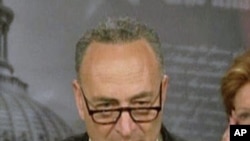There is a move in the U.S. Congress to put more pressure on China to revalue its currency, the yuan (also known as the renminbi). Some lawmakers say by keeping its currency artificially low, the Chinese government is subsidizing exports and putting American jobs in jeopardy. The Chinese are standing firm.
Sometimes a bargain is no bargain at all.
Some members of Congress say cheap Chinese imports carry a stiff price. They say China manipulates its currency to lower the cost of its exports, undercutting American manufacturers.
"Everyone knows what a scourge this is," said Senator Charles Schumer.
Senator Charles Schumer - a New York Democrat - says the United States should impose punitive tariffs, if necessary, to level the playing field.
"I believe the Chinese don't believe in free trade," he said. "I believe they are mercantilist, that they simply want to increase economic power and will do whatever it takes to do that and the only way to change that is by forcing them to change."
Other senators are joining Schumer in an effort to pass legislation to force the Obama administration to get tough with China on the currency issue.
It is a true bipartisan effort. Opposition Republican Lindsey Graham of South Carolina says something must be done.
"Simply stated, China is too big of a player in the world to manipulate their currency," said Lindsey Graham. "They just have too much impact."
The White House has not taken a stand on the proposed legislation, focusing instead on President Obama's one-on-one discussions with Chinese leaders.
He brought up the issue during a visit to China in November. But so far, the diplomacy has had little if any impact.
At a recent news conference, Chinese Premier Wen Jiabao dismissed demands for a currency revaluation.
Mr. Wen said these demands are unhelpful, and even a form of protectionism.
Graham and Schumer say Mr. Wen was showing China's true intentions on trade. But experts on Chinese affairs see his words in a somewhat different light.
"I think you are seeing the evolution of politics in China more than anything else," said Charles Freeman.
Charles Freeman runs the China program at the Center for Strategic and International Studies in Washington.
"I think you are seeing Premier Wen, the prime minister, addressing not so much an American audience or President Obama, but addressing a very increasingly restive population that wants, or that appears to want, the Chinese leadership to stand up to international pressure," he said.
President Obama faces domestic political pressure of his own in dealing with the Chinese currency issue and its impact on trade.
At a time of high unemployment, he is pushing increased US exports as a way to create jobs.
"To look out for our workers, we've got to be able to compete in the global marketplace," said President Obama. "It's never been as important and opportunity for America as it is right now."
But Charles Freeman says for now the president is letting Congress do all the talking about penalties.
"There is always that dynamic to international trade and economic negotiations where the administration goes and says to the other country, 'Well, if you don't do this, then I can't tell you what the crazies in the Congress might do!'", he said.
In April, the administration will have to take a very public stand on the controversy. On April 15 the Treasury Department will release a report listing countries that manipulate their currency. Lawmakers say China should top the list.




